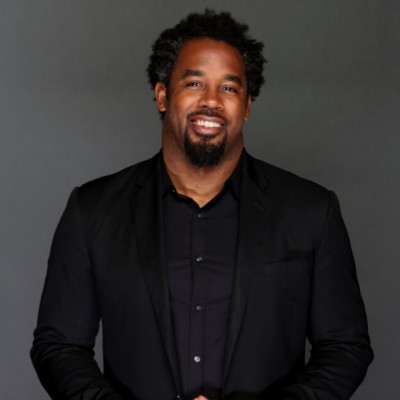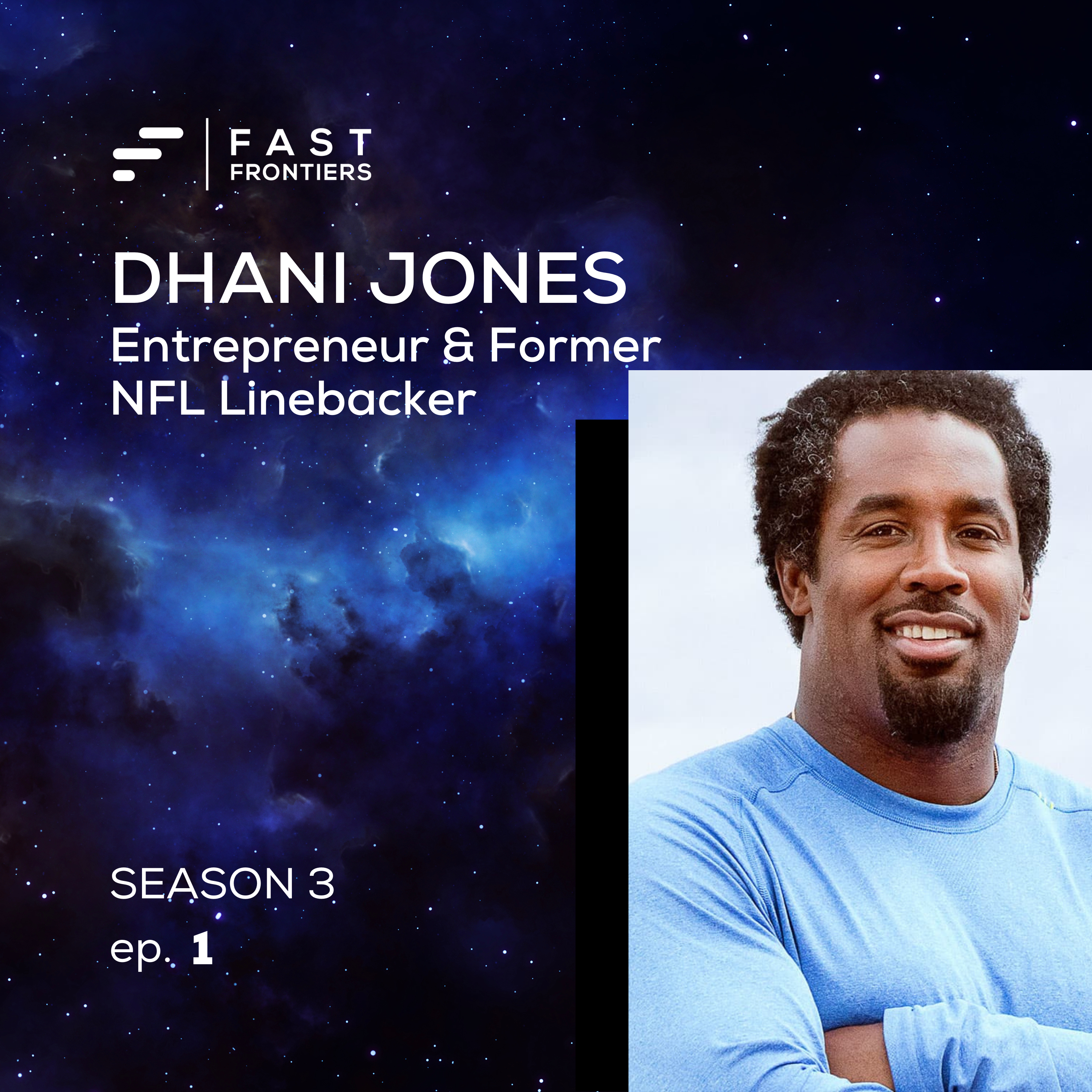S3 Ep 1. Dhani Jones: Entrepreneur & Former NFL Linebacker
- 0.5
- 1
- 1.25
- 1.5
- 1.75
- 2
Tim Schigel: Welcome to Fast Frontiers. I am your host, Tim Schigel, managing partner of Refinery Ventures. In this episode, we're talking to Dhani Jones. Dhani is an entrepreneur, philanthropist, author, host, and explorer, who began his career in the NFL as a linebacker playing with the New York Giants, Philadelphia Eagles, and the Cincinnati Bengals. In this episode, we're going to dive into how a professional athlete and entrepreneur are actually very similar, and Dhani's focus on the future of mobility through working with Assembly Ventures. The biggest theme or so what I hope you can take away from this conversation is that the main role as leader, both CEOs and coaches are trying to get their team to be as high performing as possible, always improving. You can look to the coach as the conductor, being able to identify who has what gifts and what role they will play. The best conductors have awareness and power those that they lead. Please enjoy my conversation with Dhani Jones. So if you're an entrepreneur, a community builder, an investor, or a sports fan, you are going to love today's guest, the Dhani Jones. Welcome, Dhani.
Dhani Jones: What's up? What's up?
Tim Schigel: So we're here talking about Fast Frontiers, how innovation's accelerating in unexpected places. And there's nobody faster on more frontiers than Dhani.
Dhani Jones: I wish.
Tim Schigel: You are, dude.
Dhani Jones: I wish I was fast.
Tim Schigel: Used to be fast, come on.
Dhani Jones: I used to be fast on the field. And I think I actually used to be faster. And I've always been told if you're early and you're right, you're still wrong. And a lot of times, I was probably wrong, but it was probably because I was early and it was probably because I was too fast. But now, thank goodness, I'm slowing down, so I'm actually starting to get it right.
Tim Schigel: You know what I like about that? You're learning, that's what I like about that. You've learned from that.
Dhani Jones: I think a lot of times, well, it's cliché to say, but you have to keep learning. I mean, life is a learning journey. You have to go on a learning safari all the time. I just don't think a lot of people take that too seriously. They put the books on the shelf, but they don't wander through the pages. They open up their computer, but they don't necessarily find their way through the internet. They have conversations with people, but they never really get past the surface level. And so most of life is spent in a very thin, thin layer, where you don't really kind of get into the details of it. I mean, people play the guitar, but they don't really know that the guitar is a '66 Martin. They don't know the warm melodies of where it came from. They see the poster of Jimi Hendrix, and sure, they've heard him play, but they don't know that I guess he was right-handed, but he played left-handed. All these different nuances of life, people don't dive into it because we don't spend enough time on it anymore. There's no time anymore, Tim. There's no time.
Tim Schigel: Well, this is the point of the Fast Frontiers. Things are moving faster and faster, and if you can't make sense of it, then you might get lost or dizzy. That's actually why this laptop, you can't see it, but I have two stickers on this laptop, Jimi Hendrix and Schrodinger's equation because-
Dhani Jones: See, you had me at Jimi. But the equation...
Tim Schigel: Quantum physics, baby, quantum physics. Quantum physics.
Dhani Jones: I know. I know. But I just had to dig deep back into my University of Michigan education and just start to go back to some of those equations and just remember what you're actually talking about. That, as well as going through some of my previous episodes on Star Trek.
Tim Schigel: Well, you reminded me of it because of the guitar because you can play guitar, but to convey emotion, which is what Jimi Hendrix did, which can travel the universe and overcome time, that's powerful stuff right there when you convey emotion, so that goes beyond playing. That goes beyond the mechanics.
Dhani Jones: So how does one convey emotion through a guitar?
Tim Schigel: Talk to Eric Clapton. Talk to Jimi. It happens, right? You can hear a note and it can make you start to cry. Right? Or get excited. And that's the goal. Right? It's communication, just like having a deeper conversation really connecting with somebody, that's the key. That's the key to relationships. That's the key to how our world is meant to work.
Dhani Jones: So how do you feel the world is doing right now, communicating their emotion through playing the guitar? Because I would surmise that a lot of people are just playing the guitar for themself. And I would surmise that most people have just turned the speaker back in their direction because they like to hear their own voice. There's less of a movement towards playing the guitars for the community so that they can learn and they can feel that emotion, if you will. But I don't know, maybe I'm completely wrong. Maybe I'm just 43 years old now. Maybe I just had my birthday, and maybe I'm just going through something. But I just feel like sometimes like the voices are just everywhere, but the voices hardly mean anything, and it's a tough frontier to travel through, only because I think a lot of people do need the voices of emotion to kind of surround them. You're seeing it in the emergence of new technology and new applications, where people are kind of gathering in these places to hopefully hear something to hang onto.
Tim Schigel: Ah, you just hit on the word I was going to bring up.
Dhani Jones: Okay.
Tim Schigel: The only way to convey emotion is by being a good listener. You need to listen. You need to understand your audience.
Dhani Jones: So by that, are people not tuning in any longer? Are people not listening any longer?
Tim Schigel: They're not listening. There's a danger that they're not listening.
Dhani Jones: Or are people's ears not in sync? Are they not tuned in? Or are they not balanced? Just to kind of go along with all the rest of the metaphors when it comes to music. Oh, by the way, I used to play the bucket bass, and I don't know if you know that, or what it is. But if you watch any of the-
Tim Schigel: Like standup, like the standup?
Dhani Jones: Yeah, the bucket. The stick and the string and the bucket.
Tim Schigel: All right. Oh, the actual bucket.
Dhani Jones: That communicated a lot of emotion, especially in the New York City subway.
Tim Schigel: I wish we had some video of that. That would be a good TikTok right there.
Dhani Jones: It's out there. It's out there somewhere.
Tim Schigel: So listening, yeah, listening is a key component of all of this. So let's go to the obvious thing that people probably want to know, which is, you had this incredible career in the NFL. And as a leader, how has that translated to your work as an entrepreneur? Because you've been an entrepreneur now longer than you were in the NFL. Right?
Dhani Jones: I suppose. I really, I love the word entrepreneur. I'm sure it's been designed in so many different ways. But when I apply it to the world of the NFL, or I apply it to the world of sports, I think that everybody that plays sports is an entrepreneur. Anybody that plays professional sports definitely is an entrepreneur. Anybody that thinks about the world of sports is considering entrepreneurship because you're sitting here with your kids, you are a child, or you hope to have children, or you are trying to figure out what do you want to do in this world, and everybody kind of goes to this world of competition, which is very innate and really very human-centric. And you invest all of a sudden in yourself, and that's what entrepreneurship is all about. Right? If you want to characterize it by the different levels of investing, from pre-seed to seed, to series A, to series B, series C and D, and et cetera, you can look at the different levels of which you participate in the game itself as different levels of investment. Right? You could say that your parents provide your pre-seed investment. And then all of a sudden, you can think about your college as maybe your seed investment, or maybe series A, depending upon-
Tim Schigel: Series A, series A.
Dhani Jones: Depending upon where you go. Okay?
Tim Schigel: If you went to Michigan series A, is that like seed plus?
Dhani Jones: Well, University of Michigan is basically, you've taken your stock public because it's the ultimate windfall because you know that the opportunities and what's on the horizon are not going to get shorted like some of these other companies that are out there. People are going to invest in the long-term with patient capital because they know what type of returns they're about to get. But that's what entrepreneurship is all about, is about investing in yourself. And that's what sports is all about, it's all about investing in yourself. And I think anybody that doesn't see it that way when they come out of the league, that's why they're confused, because all of a sudden, now you want to go into sort of... You want to jump into the river when you've always been a creek. You've always been-
Tim Schigel: Yeah. You're part of that organization, that team, but unlike a lot of other teams, you also have to be self-reliant because the stats and the performance is still individual. Right? I mean, you still have to perform within that context of the team, which is that self-reliance component that's a lot like being an entrepreneur.
Dhani Jones: Yeah, if you're playing on a team sport versus an individual sport, sometimes it's a little bit more heavily scrutinized. Right? If you're playing tennis versus if you're playing football, it's going to be two different things. And a lot of times when you look at football, you're measured against other people, and you're also measured against, I don't want to say the curve, like all of a sudden, you've got this big old test and you're trying to figure out the curve. And you're trying to figure out where you kind of fit. But you do have that individualized evaluation, and that is entrepreneurship. How do you measure yourself against yourself when you're going into this market, just trying to figure out how you can pivot in order to make a successful business arrive where it needs to be so that you can get the next level of investment, and so you can continually grow the company.
Tim Schigel: It's a constant improvement and experimentation. I don't even know how many different businesses you're involved in, but I know some of the recent ones I've seen look super interesting. And you and I haven't had a chance to talk about it. So with the one I guess maybe I'll start with, this Assembly Ventures. Tell us a little bit about that and where that came from because you've been in Cincinnati, just so people understand, you were in Cincinnati. That's when you and I met. We were involved in a number of things, then went back up to Michigan and Detroit area. Yeah, so tell us what's going on now.
Dhani Jones: Yeah. So I guess the long story short is I made the move with my family from the Cincinnati area up to Detroit world because I wanted to spend a lot of time with Dan Gilbert. And Dan has been an incredible entrepreneur. You want to talk about someone that has pivoted several times, but at the same thought, really grabbed hold of a marketplace where I'd venture to say anybody, no pun intended, that's listening has probably utilized Rocket as their way of acquiring their house. You know what I mean? So I came up to Detroit because not only was he building an amazing company, and at the time it was called Quicken Loans, he was also really focused on helping revitalize. Right? There's always been this amazing structure to the city of Detroit, and had always been an amazing convening of people, and also at the same time, for a lot of people that don't know, a lot of the African American middle class was built here. And it was built because of the world of mobility, the world of cars, Ford and GM and Chrysler, and all these other automotive businesses that are based in the Midwest. And so while coming here and thinking and talking to Dan about different things that he was doing, and watching Quicken become Rocket, and Rocket go public, and all the different automotive sector. And I started watching all the rest of the automotive world start to germinate, and started to shift gears, no pun intended because there's no gears anymore. Right? If anybody's listening right now, I bet half of you don't even know how to drive a stick shift car. Right?
Tim Schigel: That's true.
Dhani Jones: That's the first car my kids are going to drive is a stick shift car.
Tim Schigel: All my kids learned on stick.
Dhani Jones: Long throw, no short throws. I want long throw. I want a complicated clutch. You might have to gas it a couple times in order to get the car started. That's the type of thing that you need to begin with.
Tim Schigel: And for the young parents listening, by the way, one advantage of this is then it makes it much harder for them to text and drive.
Dhani Jones: Much harder to text and drive, as well as they're always the designated driver because people don't know how to do it at all. So a simple trick, get your kid a car with a stick shift, and everybody's like, "Oh, man. They always go to be the one driving because I don't know how to drive that car." No one knows how to drive though.
Tim Schigel: Or when your buddies want to borrow your car, "Hey, can I borrow your car?" "Sure, you drive stick?"
Dhani Jones: Sure. Oh, man. Plus, it's a great deterrent because you can always leave the keys in the car because most people just don't even know how to drive it anyway. So the world of mobility started to reveal itself. And coming here, spending a lot of time, I started a data analytics company, and then I really started spending time with another guy named Chris Thomas, Christoper Thomas. And he had started his own firm with the Ford family not too long ago. And I had inaudible roads, and we had talked, and we had discussed different things. And we just talked about the future of mobility. And in the midst of all of these discussions, one of the companies that I really started to get to know that was not a part of Dan's portfolio, was not a part of Christopher Thomas' portfolio either. He was a gentleman named Glenn Gonzalez. And Glenn started a private aviation company. And his goal has always been to maximize the opportunities for those that are traveling because I think that just as the world of cars is changing, the worlds of airplanes are changing as well. And Honda Jet is one of the most amazing planes, not only does it have the comfort, not only does it have the distance and speed, it's also about the efficiency. Right? And I can remember when I first got into the National Football League, I was always trying to figure out how I could fly private. I could never make sense of it. I always wanted my own plane, but I could never, ever make sense of it. Just numbers never added up. And I think for a lot of people out there too, they're like, "Yeah, the numbers definitely don't add up because it's $8,000 an hour." Right? But when you think about the efficiency or you think about the size of planes, and you think about the distance, with technology and mobility coming into sort of the area of research and development and things getting smaller, and things getting faster, and things getting more efficient, but at the same time, maintain their level of comfort, that's how Jet It sort of became an amazing business that's been around for the last two years. And Glenn being an amazing entrepreneur, spending a lot of time with him, and then my conversations with Chris, these worlds of mobility start to merge together. And as I've always thought about in the future, there won't necessarily be as many people, like Back to the Future, driving stick shift cars, but there will be some. Right? There'll be more people in electric vehicles, although-
Tim Schigel: There'll be collectors.
Dhani Jones: There'll be collectors. Exactly. There'll be people that will be flying on eVTOLs and other types of vertical takeoff automobiles if you will. And my conversation with Chris was, "What are you going to do next after you left your former firm?" He's like, "I'm starting Assembly Ventures." And it's really bringing together a lot of operational leaders that are focused and love the world of mobility in terms of how we can sort of bring these thought leaders together in order to identify the best companies to invest in that are going to be a part of the future of mobility. And so if you're in the Detroit world, or if you love cars, if you love sort of the classics, you also have to understand. Where's the future going? And how will the past be relevant to what's going on in the present, but ultimately into the future? And you can't, going back to sports, you can't do it by yourself. You can't sit around in your own arena, if you will, you can't in your own studio, and just listen to your own music. You have to play the chords so that other people can feel that emotion. And I think that we've created an orchestra of a firm, an orchestra of a team, an orchestra of a team that is able to sort of play the music that will affect the rest of the world. And that's what Assembly's all about.
Tim Schigel: That sounds very exciting. My son, I think you know, my son's in Michigan. He test drives cars, so he's in the automotive industry. At Rivian is another big future car company up there.
Dhani Jones: Rivian, obviously everybody knows Tesla and Lucid. And they just went through their SPAC. But there's going to be so many more companies. And a lot of people look at the finished product of the car, nevermind the technology that's in the car. Right? We have to think about the electric vehicles and how they're disassembled because the traditional car of the engine and the chassis and the drive train and the wheels and the suspension, all that is going to be completely different, every single piece. And so while there's going to be explosion of all these amazing cars, there's also going to be new technology, and there's going to be new types of manufacturing and new types of IP that's going to start to come into the fold. And so being at the forefront of that, and one of the other things that we see at Assembly is that we're working also in Europe just as much as we're working in the United States. And so there's also this amazing opportunity to bring not only just American minds, European minds, every person that is at the table should be around it in order to be able to talk about where the world of mobility is going. And that's why we're in two different countries, but we're able to be on these one continent and bring a bunch of people together, and then be on another continent and bring a bunch of people together as well.
Tim Schigel: I imagine another part of that impact is just how it changes urban life and communities themselves, and how they change over time. Right?
Dhani Jones: Yeah. Everything. I was talking to a gentleman who gave me a reference to CityLabs. That's Google's efforts in order to think about revitalizing different downtown cities and what that would look like in the future. But I also think about telecommunication when I think about 5G infrastructure, how that is also too related to the world of mobility. When we think about the infrastructure as it stands currently and where we are with whether you want to call 5G, 5G, or whether you want to call 5G really 4G. Right? A lot of it hasn't gotten to where it needs to be, and with all of our technology that surrounds this being online, or the internet of things, I believe that the car, or the eVTOL, or any other types of device will become that internet of things. And so as you start to identify these different cities, they're going to have to be in the right place where they're set up to be able to manage the load on the system. And so that's something else that we think about. And I have friends that working in the instant infrastructure space, where they're also creating platforms as a service. A lot of people have seen what happened with Google Loon and Google Titan and some of the other companies that are out there, even Facebook, trying to identify different ways in order to create telecommunication infrastructure that really lives at altitude. Where right now, a lot of the things that we're doing are terrestrial. Right? So a lot of the towers and the 5G infrastructure allows people to communicate that way. But we know that we're going to need more towers. We're going to need more infrastructure. Elon is obviously doing a lot of stuff with satellites and inaudible and other types of things. So I have some friends, one specifically, a company called Sky that's creating that instant infrastructure, where they're putting up geostationary stratospheric air ships that also have a node that can go direct to handheld. If you can go direct to handheld, that means you can go direct to automobile. Right? If you can go direct to automobile, you can go direct to any other type of IOT device, and there's going to be need for more of that massive infrastructure to take place. And so we think about that too at Assembly. Right? And everybody should be thinking about that from an investment standpoint because not everything is... Everything right now is going to be completely different. We're night in the nascent stages of this new frontier of technological innovation. And to your point, it's happening right now.
Tim Schigel: If you're trying to navigate this, understanding kind of these major currents and streams and where they're going long-term, super, super important. Not just what's right in front of you, and not what you're looking at in the back mirror, but where it's going long-term.
Dhani Jones: Yeah. And I think it's hard to do that because everybody's... I would say the majority of people are concentrated on what's happening now. There are a fair amount of people that obviously pay attention to the history, but there's not a lot of people that look towards the future.
Tim Schigel: Right. Well, it's like what you started out saying at the beginning of this, which is you were right, just you were too early.
Dhani Jones: Right.
Tim Schigel: On so many things.
Dhani Jones: And a lot of times, those that are early adopters are the ones that fail because they're going so much against the grain. Right? Has anybody ever turned around and walked the opposite direction when you have a massive hoard of people coming at you? You're probably going to get trampled. All of a sudden, you're trying to push upstream, trying to go up the stairs while everybody's coming down, in order to kind of catch the four train in New York City. It's really, really tough to do, and there's a lot of people that are pushing and shoving. And they're telling you, you're not going the right direction. And that entrepreneur is that salmon that's swimming upstream in order to make sure that their family's going to continue. But a lot of people don't realize that salmon also passes. Right? Once they get to their destination, they pass on. Right? So it's hard being an entrepreneur. It's hard playing that music. And a lot of people ultimately don't last. And sometimes maybe it's better to be second than it is to be first. But if you actually are able to survive being first, then you can make an incredible impression on what's going to happen in the future because you have a hand in it.
Tim Schigel: Absolutely. And whether you live to see it or not, your fingerprints are on it. Right?
Dhani Jones: And I think just like the music, it never stops.
Tim Schigel: Well, speaking of music and harmonizing, in terms of team building, when you're trying to lead a team through this stuff, you've got this kind of figured out in your head, but now you've got to get people to harmonize, like you said, to build the orchestra. You've been a team captain. Right? I would imagine you've learned some lessons being a team captain to say, "How do I get these people that are all different, that all have different capabilities, different thoughts on what the game plan should be?" Game plan, see that.
Dhani Jones: I did hear that. I like that.
Tim Schigel: Weave that in here. You can weave that into this. How do you do that as a leader?
Dhani Jones: I think on the one side, you could look to the coach to be the conductor and to identify who should sit in what seat. Right? Your first violin versus your second or your third. Another way you could look at it and have the conductor be one of the players in the symphony. Another way you could sort of identify is that they all have since played together, and they've already early in their lifetime defined who they are. So each of these different dynamics of identifying leadership and being able to identify who has what gifts and which role they will play have different evolutions. In my life, I think that I've always had really great conductors, great coaches. And when I haven't had great coaches, it's worked out too, but it didn't feel the same way. You didn't create the same music. And the best conductors I think empower the first chair to lead the orchestra. And all the conductor is essentially doing is moving their hand. But it's really the first chair that is setting the melody of the entire orchestra, so to speak. And so I can speak to specifically when I was in Cincinnati and I was playing with the Bengals with Marvin Lewis. I don't necessarily know if we got along right away because we definitely had our arguments. And it's not to say that leadership doesn't come with its rifts, if you will.
Tim Schigel: Oh, yes.
Dhani Jones: But we figured out what each of our notes were, and we began to therefore put things on paper, even though sometimes I would scratch off one of his and he would scratch off one of mine. And even coach Zim, who's now the head coach at Minnesota Vikings, him and I, we too had some moments where we were scratching each other's notes off the piece of paper and throwing them in the trash and walking out of the room. But if you want the symphony to continue, you have to learn how to play together. And it's really about becoming fast friends and really kind of getting off the superficial level of which we were talking about before, and getting into the details of who you are. And between both coaches, I started to find my voice. This is after playing in the NFL for seven years, then all of a sudden, arriving at the Cincinnati Bengals just in a different place in life. And to be honest, my first year here, I almost didn't even make it through the first year. I almost didn't make it through to sign my first contract with the Bengals because my body was a little bit older and weathered. But at the same time, eventually, it did work. I was able to make it onto the field, and I played actually in my first game, I think three days later. But the leadership was formulated by the conductors of the team that empowered me to sort of utilize my gifts, if you will, as someone that has been in the league for a long time in order to kind of lead the team as I did. And the way that I like to lead is I like to just empower others. And I know that I'm not necessarily the best football player, never was the best football player. I was good, but I wouldn't say that I was the best player on the team. But what I'd really love to be able to do is learn what everybody else was doing on the field, what everybody else responsibility was.
Tim Schigel: That's huge.
Dhani Jones: So that I could find whatever they're doing, I knew then therefore, I could play off of them. And if I knew it well enough, I also knew them well enough to know when they would take liberties, and then when I had to make my own personal adjustments. And then you start to build your level of risk tolerance and then find where you can make an impact. And those are those big plays.
Tim Schigel: But you hit on something I want to come back to because you talked about you and the coach scribbling your different riffs, your notes, trying to find the right ones. Right? And I just had this conversation with a leader in one of our companies yesterday about tension, good tension in meetings, to strip away, because you both come to a meeting on a topic or a play you're going to run. And you both come with different assumptions that are sometimes not spoken. Right? So you're thinking, "I've got to go do this." And the coach is going, "No, I want you to do this." But you're both, you have some of the same idea, but you also have some different ideas. And until you clash a little bit, you don't know what those different ideas are. And it's sort of like you have to strip away all the noise and the extraneous stuff. If anybody ever watches American Idol, you know when they have these kids that sing, and they're brilliant, and they're super good technically. But you'll hear them get kind of criticized because they get away from the melody. Right? They start doing too many runs and riffs. And they're like, "No, keep it simple because the emotion comes through when you keep it simple and locked on that melody." And sometimes we can't find the melody. And then when you start to get that efficiency, because then you get the efficiency because you're not doing all these other things. You're saying, "Look, we know what needs to be done, when it needs to be done, and it's in harmony." It's all locked in like a team, one unit.
Dhani Jones: Yeah. And I would say, yeah, with Coach Zim, it was that way for a little bit where we had these tension moments. He used to yell at me all the time, all the time. I mean, I don't know if there was a polite word that he used with my name associated with it.
Tim Schigel: Uh oh. That's because he loved you, that's because he loved you. He was just trying to make you better. He saw your potential.
Dhani Jones: He would shake his head at me so many different times. And I can't remember if I went to his office, or he came down to see me at my locker, or maybe it was just in the team meeting room, because I just completely disagreed, or I said something. But all of a sudden, to your point, I backed it up though. I backed it up with some other information that I had found. So in football, you do a lot of research and discovery on the other team, and understand what they're trying to run and what you're going to run. And he made this play, I can't remember what it was. It was kind of like maybe me blitzing the A gap, and the inaudible linebacker coming around top, or the defensive end folding in. There's all these different things that were happening. And he designed it against whatever specific amount of plays. And I just thought that, just remembering lightly, that maybe I should go one gap further. And him and I had this big blowup in the meeting. And we walked out, he walked out, and he said some expletives. I of course was the very mature one in the room.
Tim Schigel: Oh, of course. I'm sure.
Dhani Jones: Had to be the mature one. But then we met up later and he understood sort of my point. And to your comment, you can go to the right or to the left. You both have valid points, but until you inaudible those points are, you go in such a divergent way that the strain created can also be felt through the rest of the team. And as leaders, you need to be able to sort of quell that frustration and identify, utilizing your metronome, what beat you're really going to work with. Right? And so once we were able to kind of find that one, two, three, one, two, three, once we did that, we got on the same page. And sure, the expletives still continue from the practice to the field, to maybe after the game sometimes. But we knew we were on the same page, and then so you take it differently. And that's when we really started to... He empowered me to lead on the field while I respected his leadership from the sideline.
Tim Schigel: Yeah. Got it. What's great about that is again, you want some of that tension. And when somebody's engaged and starts to get emotional about it, they actually means they care.
Dhani Jones: Yeah. They care. But here's the thing, it's really, really hard now for people to sort of understand that sort of environment. It's so hard. Now in our world, it's really tough to sort of have those challenging conversations because there's so many other nuances that are surrounding things. And as an entrepreneur and as a leader of a company, you have to be so sensitive and you have to have... But at the same time, you do have to work towards identifying that own personal, not IQ, but EQ, around others, so that when you find those tense moments, you're able to solve them because that's going to be to either the benefit or to the detriment of the company. And I think that's the most important thing for any leader to be able to understand, is not only how you lead your gifts and other people, and they lead, and their gifts and how you fit within the orchestra, but having that EQ to be sensitive enough in order to kind of feel where people are. I think that's sometimes what's occurring right now in our world as people are deaf to the outside. Right? They're not hearing anything. They're not listening to other people. They're just turning the speaker towards themself. And they're blasting it and saying, "What did you say? What did you say? What did you say? I can't hear you. What? What?"
Tim Schigel: In all caps. In all caps.
Dhani Jones: That person's revving the engine. I'll bring it one back. Remember, I think it was, I'm bringing it back to Top Gun. Tom Cruise, I think-
Tim Schigel: Another metaphor, ladies and gentlemen. Here it is.
Dhani Jones: He was getting in an argument and he was revving the engine to the motorcycle. Right? A lot of people are just revving the engines in the motorcycle. It's like, "What? I can't hear you. What? I can't hear you." Right? So a lot of people are doing that nowadays. And now you just need to learn how to turn the motorcycle off. You need to go sit down, pour yourself a nice cup of coffee, and tune out the rest of the world and have that one-on-one conversation and really get to the meat of it, really start to identify. What's the baseline? Because that's where the song is set.
Tim Schigel: Nice.
Dhani Jones: You like that too?
Tim Schigel: Nice. Man, bringing it home. I feel like I have to pick up a guitar now. I'm getting inspired.
Dhani Jones: You should do that. Maybe not today.
Tim Schigel: That's okay. Some episode, we'll do that.
Dhani Jones: I think one episode, you should just play the guitar the entire time and say, "Today has been brought to you by me. And I'm just going to play this song."
Tim Schigel: Oh, no, no, no. That wouldn't be good. Last time we were together with music, we were in New York City for the Young Professionals Cincinnati and New York.
Dhani Jones: Yeah.
Tim Schigel: Remember that? That was kind of fun.
Dhani Jones: Music might save us all. But music needs to come back.
Tim Schigel: Yeah, real music, not inaudible.
Dhani Jones: Real music needs to come back, real melodies and real riffs. But just like the world of mobility, just like the world of investing, just like the world of sports, everything will be different. And they'll be different for the better. Right? They'll be different because that's the direction things are starting to go. And just like everything else, it's going to take time for things to work themself out, and you have to do that with the rest of the 10 players, like I like to say, on the field, so that we can all eventually move in the same direction.
Tim Schigel: Absolutely. And I'm hopeful that those voices are clear as a bell with those strong melodies, those will come out. Right? Those will come out and we'll start making sense of all this. Dhani, you have so much to offer. Thank you very much for the magical musical metaphor tour. All right, well, have a great day.
Dhani Jones: All right. Thank you, Tim.
Tim Schigel: Thanks for listening to Fast Frontiers. If you like our show and want to know more, check out our website, fastfrontiers.com. If you enjoyed this episode, please share it with others and leave us a review on your favorite podcast platform. Again, in this first week of Fast Frontiers, season three, we have three great conversations to share. You can listen to them all right now. Join us next week when we bring you our first duo episode, a conversation with Nick Cromydas at Hunt Club and Kaleb Dumot of Integrity Power Search. The Fast Frontiers Podcast is brought to you by Refinery Ventures. Our producer is Abby Fittes, audio engineering by Astronomic Audio, marketing, content, and social media support from Content Callout, and our podcast platform is Casted.
DESCRIPTION
In today's episode, we're talking to Dhani Jones. Dhani is an entrepreneur, philanthropist, author, host, and explorer, who began his career in the NFL as a linebacker playing with the New York Giants, Philadelphia Eagles, and the Cincinnati Bengals. We're going to dive into how a professional athlete and entrepreneur are actually very similar, and Dhani's focus on the future of mobility.
Please click on any related resources below for more information about what we discuss in this episode.
Today's Host

Tim Schigel
Today's Guests








